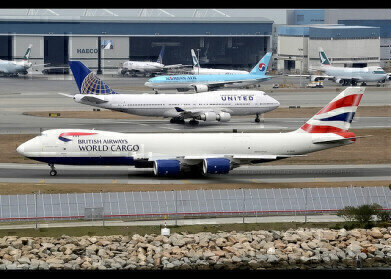Fuel for thought
How to Power a Jet with Decay Remains
Dec 27 2015
With countries across the globe committing to slashing their CO2 emissions, biofuel is becoming an increasingly popular option. Now, a newly established consortium of scientists and aviation companies is developing cutting edge new technology that could see jets powered by decay remains. Sound sinister? It’s not quite as ominous as you may think…
Fuel from the forests
The brand new concept will essentially see biofuel created from forest-industry waste. Think as branches, sawdust and other organic matter. The University of British Columbia (UBC) and NORAM Engineering and Constructors are fronting the project, with cooperation from various different aviation companies including Boeing, Air Canada, WestJet, SkyNRG and Bombardier. Canada’s Green Aviation Research and Development Network (GARDN) is funding the project, which is a key venture in its portfolio of green technology investments.
UBC and Boeing recently completed feasibility study that confirmed forest-industry waste has huge potential as an aviation biofuel resource. When subject to thermochemical processing the forest derived biofuel could meet a huge 10% of British Columbia's annual jet fuel demand. This represents 46 million gallons of power, as well as the potential to slash annual CO2 emissions by 1 million tons if it was rolled out to ground and marine vehicles. With initial research now completed, the consortium will use lab results to determine how the biofuel can be introduced to major Canadian airports and ground transportation hubs.
Boeing goes green
It’s not the first time Boeing has dabbled in eco-friendly initiatives, with the iconic company recently flying a 787 Dreamliner across the Pacific Ocean, powered with a mix of standard jet and cooking oil derived biofuel. It’s now partnered up with Commercial Aircraft Corp. of China (COMAC) to mass produce the biofuel in a purpose built plant.
“Sustainable aviation biofuel will play a critical role in reducing aviation’s carbon emissions over the long term,” says Julie Felgar, managing director of Environmental Strategy & Integration for Boeing Commercial Airplanes. “Canada is in a terrific position to leverage its sustainable forests to make environmental progress for its aviation industry and other transport sectors.”
Eco-friendly fuel is a rapidly emerging resource, and ‘Biofuels and their Precursors – A Challenge for Common Elemental Analyzers’ explores the revolution in more detail. The industry isn’t without its challenges though, with second generation biofuels facing up against an array of challenges. Quality control is a major concern, with scientists continually looking at new ways to keep biofuel standards in check.
Image via Flickr Creative Commons. Photo credits: Christian Junker
Digital Edition
PIN 25.6 Buyers' Guide
January 2025
Buyers' Guide Directory - Product Listings by Category - Suppliers Listings (A-Z) Articles Analytical Instrumentation - ASTM D7042: The Quantum Leap in Viscosity Testing Technology -...
View all digital editions
Events
Jan 20 2025 San Diego, CA, USA
Jan 22 2025 Tokyo, Japan
Jan 25 2025 San Diego, CA, USA
SPE Hydraulic Fracturing Technology Conference and Exhibition
Feb 04 2025 The Woodlands, TX, USA
Feb 05 2025 Guangzhou, China



















